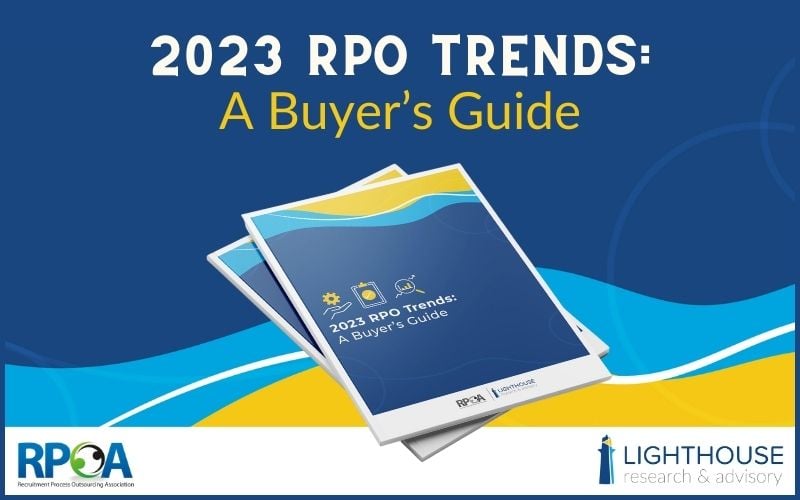
During a recent RPOA Expert Panel webinar, Ben Eubanks, Chief Research at LHRA, Pam Verhoff, President of Advanced RPO, and Jason Krumweide, Executive Vice President of Broadleaf Results, joined RPOA's Executive Director and CEO Lamees Abourahma to discuss key takeaways from the report and shared insights on successful partnerships between employers and RPO providers. The goal was to help employers make informed decisions when choosing an RPO partner. Here's a recap of their discussion.
Quality Of Candidate, Key Preference For First-Time RPO Buyers
Unfamiliarity, costs, and control concerns deter companies from using RPO, Eubanks told the audience. However, he said that the research shows that delivering quality candidates is the top preference of companies open to partnering with an RPO provider. He said many companies still need to familiarize themselves with RPO, which creates concerns about using it to solve their hiring challenges. The main concerns for companies not partnering with an RPO provider are perceived high costs and budget constraints. However, RPOs can provide cost savings by improving efficiency and quality compared to in-house recruiting. Companies also fear losing control over recruiting and perceive risks in outsourcing the function. However, all hiring has inherent risks, and RPOs can help mitigate these risks. Eubanks encouraged RPO providers to consistently focus on measuring and proving their ability to find and hire higher-quality candidates.
Quality of Support, Key Decision Factor For Existing RPO Buyers
For companies familiar with RPO, the decision to partner with a provider is complex, Eubanks said. It depends on factors like the company, industry, and types of hiring, among others. When companies decide to use RPO, the report showed that their number one deciding factor is the quality of support. Cost consideration has also risen in importance.
Eubanks attributed the rise of cost considerations to changes in the hiring landscape, such as hiring slowdowns, layoffs in some industries and companies, and increased pressure on companies to manage costs. However, cost is not the primary driver for companies already using an RPO. They understand that choosing the cheapest option can lead to challenges, particularly in the quality of support received.
Top Services Employers Expect Quality of Support From Their RPO Partner
The top three services employers want quality of support from their RPO partner, in order of priority, are:
-
Aligning Hiring Strategy With Business Objectives
-
Innovative recruiting strategies
-
Diversity recruitment to support DEI strategy
Eubanks focused on the top two services: aligning hiring strategy with business objectives and implementing innovative recruiting strategies. He and his team aimed to understand employers' expectations from RPO providers regarding aligning hiring activities with business objectives. According to employers, RPO providers can achieve this by supporting specific objectives and providing industry insights and benchmarking data. However, Eubanks noted that employers often fail to share their plans with their RPO partners, hindering effective collaboration. He emphasized the importance of employers being forthcoming about their priorities and plans, including any upcoming mergers.
In addition to aligning hiring strategy with business objectives, Eubanks found innovative recruiting strategies intriguing due to the increasing demand for such approaches. The trends report revealed a 57 percent year-over-year increase in demand. Eubanks clarified that innovation doesn't necessarily mean devising new methods but improving existing practices. He suggested that RPO providers identify and implement proven strategies to enhance employers' hiring success. For instance, he observed that many companies don't utilize their internal candidate databases when hiring. RPO providers could demonstrate to employers a cost-effective and time-efficient method of sourcing candidates.
Eubanks shares two additional insights employers want their current RPO partner to provide.
Reasons Employers Plan To Change RPO Providers
Eubanks explained the complexity behind employers' plans to switch RPO providers in 2024. According to the data, 70 percent of employers plan to make a change, with three-quarters having a good relationship with their current partner and finding value in it.
Employers switch for various reasons, including dissatisfaction and circumstances. Some plan to change because their current RPO partner needs to gain experience in new business acquisitions or keep up with hiring growth.
The data also reveals that dissatisfaction stems from unmet expectations regarding the quality of support and communication issues. Employers expect RPO providers to align hiring activities with business objectives and use innovative recruiting strategies. However, the report data shows employers aren't receiving adequate support from their RPO providers in these areas. Furthermore, employers expected additional services at established pricing, leading to unhappiness when they fell outside the contract scope.
-5_page-0001-min.jpg?width=800&height=450&name=RPO%20Trends%20Report-%20RPOA%20LHRA%20Webinar%20Jan%202024%20(1)-5_page-0001-min.jpg)
Elements Of A Successful RPO Partnership
Losing clients hurts. To help prevent breakups between employers and RPO providers, Krumwiede highlighted three skill sets required for a successful RPO partnership:
-
Mature Seasoned Executive Leader
-
Finesse
-
Empathy.
Executive Leadership involves seasoned leaders who have been through a partnership before and understand the need to relinquish control to the RPO.
Finesse refers to effectively communicating with business leaders about the RPO program, its business case, and its importance despite potential recruiting trip-ups.
Empathy means understanding that difficult situations will occur and giving the RPO provider the necessary support to navigate them.
He stressed that these three attributes are evident in successful RPO partnerships.
Verhoff agreed with Krumwiede’s points and emphasized the need to use the strength of the RPO partnership. She advised leaders to embrace and understand the partnership's power instead of feeling threatened by it, as this makes a difference in the program's overall success.
Tips For RPO Providers & Employers To Align Hiring Strategies With Business Objectives
When employers embrace RPO, they can build a flourishing working relationship. A strong relationship with an RPO provider can result in the alignment of hiring activities with business goals. Verhoff offered strategies for employers and RPO providers to use for an effective partnership that aligns the hiring strategy with business objectives. Those strategies include transparency and curiosity.
Transparency from the employer is crucial for success. Talent leaders should clearly articulate goals and proactively involve RPO partners. Clients should bring RPO partners into discussions earlier so they can be part of the solution.
Curiosity from RPO providers is encouraged. She noted that account managers must ask questions about what's happening within the employer's organization. RPO providers' effectiveness depends on the quality of shared information.
Krumeide agreed and added that proactive RPO delivery teams should seek inclusion in strategic meetings to understand clients' business dynamics.
4 Best Practices To Evaluate Quality of Support Of An RPO Provider
Krumwiede stressed the importance of employers assessing an RPO provider's support quality during the decision stage. Before addressing attendees' questions, he shared best practices for pre-screening support quality:
-
Inquire about past failures to gain insights into the provider's ability to respond and course correct.
-
Understand how the provider's Standard Operating Procedures and KPIs align with its overall operations.
-
Familiarize yourself with the provider's detailed processes, including root cause analysis and intake sessions.
-
Assess the provider's potential solutions and their effectiveness through use cases or scenarios.
As this post shows, this expert panel discussion provided valuable insights into the key factors influencing employer decision-making and what successful partnerships between employers and RPO providers look like. We highly encourage you to watch this invaluable webinar to understand these factors better and make informed decisions for your organization.


-10_page-0001-min.jpg?width=800&height=450&name=RPO%20Trends%20Report-%20RPOA%20LHRA%20Webinar%20Jan%202024%20(1)-10_page-0001-min.jpg)



.jpg)








